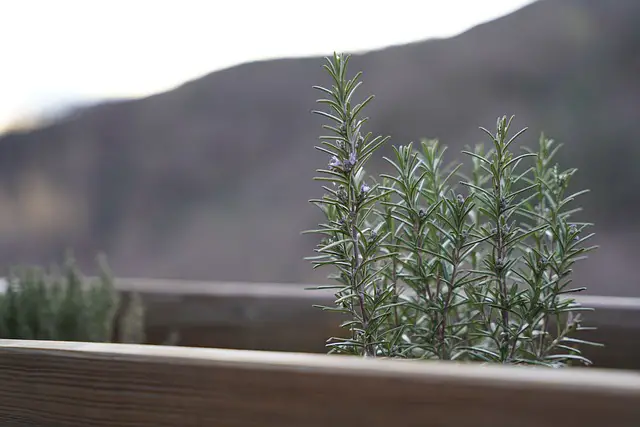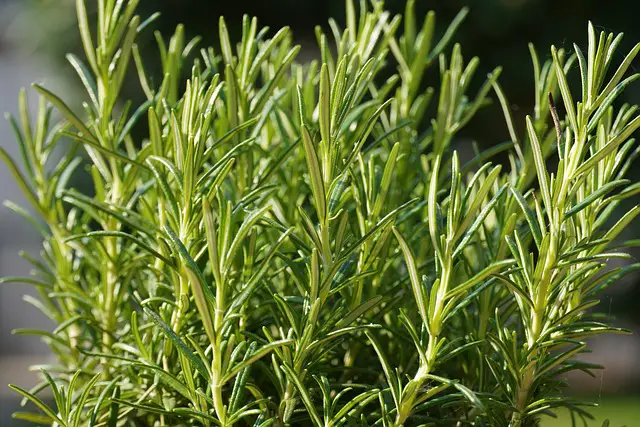Feel free to share!
Table of Contents 👈 Tap Here
Rosemary is an evergreen herb native to the Mediterranean, but it has become a favourite in homes and gardens across the USA. Its aromatic leaves are commonly used in cooking, but rosemary’s real value lies in its powerful medicinal and therapeutic properties.
Whether you’re sipping rosemary tea, using its oil for hair care or adding it to your garden, this mighty herb offers something for everyone.
🌿 Top 10 Rosemary uses

1. Boosts Memory and Concentration
Rosemary is known for its brain-boosting powers. Studies show that the scent of rosemary essential oil can improve memory retention, mental clarity, and concentration. That’s why it’s a popular choice among students and professionals alike. Simply inhaling rosemary oil before a study session or big meeting can help you stay sharp and focused.
TIP: Add a few drops of rosemary essential oil to a diffuser or apply to your temples before working or studying.
2. Promotes Hair Growth
One of the most talked-about benefits of rosemary is its ability to stimulate hair growth. When applied to the scalp, rosemary oil improves blood circulation, which encourages hair follicles to grow stronger and thicker. Many people use it as a natural remedy for hair loss, especially those experiencing thinning or early balding.
TIP: Mix rosemary essential oil with coconut oil and massage it into your scalp 2–3 times a week for best results.
3. Improves Digestion
Having trouble with indigestion or bloating? A natural remedy for you might be rosemary tea. By promoting the synthesis of bile, it facilitates the breakdown of lipids and enhances nutrient absorption. Drinking rosemary tea before or after meals on a regular basis can help to keep the digestive tract healthy.
TIP: Brew a cup of rosemary tea by steeping 1 tsp of dried rosemary in hot water for 5–7 minutes.
4. Rich in Antioxidants
Rosemary is packed with powerful antioxidants like carnosic acid and rosmarinic acid. These compounds help protect your body’s cells from oxidative damage, supporting long-term wellness and potentially reducing the risk of chronic diseases like heart disease or cancer.
TIP: Add fresh rosemary to soups, stews, and grilled dishes to enjoy both flavour and health benefits.
5. Reduces Inflammation
Thanks to its anti-inflammatory compounds, rosemary can help alleviate joint pain, muscle soreness, and even inflammation-related conditions like arthritis. When applied topically as an oil, it can provide soothing relief to painful areas.
TIP: Apply rosemary oil to aching joints or use it as a warm compress by blending it with a carrier oil.
6. Supports Immune System
Rosemary supports your immune system by boosting your body’s defence mechanisms. Its antibacterial, antifungal, and antiviral properties help ward off common infections and illnesses. With its high levels of vitamin C, it’s a great herb to keep on hand during flu season.
TIP: Drink rosemary tea weekly or use it in cooking to naturally strengthen your immune system.
7. Freshens Breath
An all-natural alternative to artificial mouthwashes is rosemary. The microorganisms that cause foul breath are reduced by its antibacterial qualities. It leaves your lips with a nice herbal taste as well.
TIP: Make a DIY rosemary mouth rinse by boiling rosemary in water, letting it cool, and using it as a gargle.
8. Helps Relieve Stress
Do you feel overburdened? Because of its relaxing properties, rosemary essential oil lowers cortisol levels, which are a sign of stress. You can reduce anxiety, encourage relaxation, and even enhance the quality of your sleep by inhaling rosemary.
TIP: Use a rosemary-scented candle or add rosemary oil to your bath to unwind after a long day.
9. Improves Skin Health
Rosemary is a herb that is good for the skin. Because of its antimicrobial qualities, it can lessen acne, ease inflammation, and even out skin tone. Additionally, it is a natural toner that reduces pores and tightens the skin.
TIP: Use distilled water and a few rosemary sprigs to create a face mist that is infused with rosemary. Twice a day, spray.
10. Natural Insect Repellent
Say goodbye to chemical bug sprays. Rosemary’s strong aroma repels mosquitoes, flies, and other common household pests. It’s especially useful in outdoor patios and gardens.
TIP: Place rosemary sprigs near windows or create a natural bug spray by mixing rosemary oil with water and witch hazel.
🌱 Ten Professional Tips for Using Rosemary at Home
11. Grow Rosemary Indoors Year-Round
With the correct circumstances, you may grow rosemary indoors even if you reside in a colder area. Put this hardy herb on a bright windowsill since it likes the sun. For limited locations, go for petite kinds like “Blue Boy”.
TIP: To avoid root rot, choose a pot with adequate drainage and water only when the soil is dry.
12. Harvest Without Damaging the Plant
To enjoy rosemary regularly, it’s important to harvest it the right way. Trimming too much can harm the plant. Instead, snip the top 2–3 inches of each stem and avoid cutting more than one-third of the plant at a time.
TIP: Cut just above a leaf node at all times to promote bushier growth.
13. Dry and Store Rosemary the Right Way
Drying rosemary preserves its flavour for months. After harvesting, tie small bundles of rosemary and hang them upside down in a dark, airy space for 1–2 weeks. After the leaves are completely dry, remove them and store them in airtight containers.
TIP: Label your jars with the date to track freshness and flavour.
14. Make Homemade Rosemary Oil
Rosemary oil is very simple to create and may be used for beauty and cooking. Fresh rosemary’s therapeutic qualities are enhanced when it is infused with olive oil.
TIP: Store your rosemary-infused oil in a dark glass bottle and keep it in the fridge for longer shelf life.
15. Add It to Your Cooking
Rosemary is a herb that can be used to improve the flavour of bread, potatoes, meats, and vegetables. Roasting and grilling do not affect its strong flavour.
TIP: Strip fresh rosemary leaves and finely chop them for even distribution in dishes.
16. Use in Natural Cleaning Products
Rosemary has antibacterial properties, making it a great addition to DIY cleaning sprays. Infuse white vinegar with rosemary and citrus peels to create an effective, all-natural cleaner.
TIP: For best results, leave your vinegar infusion for at least two weeks.
17. Create a Rosemary Hair Rinse
A rosemary rinse can strengthen your hair, reduce dandruff, and promote shine. It’s an easy and chemical-free way to upgrade your hair care routine.
TIP: After shampooing, pour the cooled rosemary rinse over your scalp and leave it for 2–5 minutes before rinsing.
18. Brew Soothing Rosemary Tea
Rosemary tea not only aids digestion but also helps relax your body and mind. It’s especially beneficial when consumed in the evening or after a heavy meal.
TIP: Add a bit of honey and lemon for extra flavour and immune-boosting power.
19. Craft DIY Rosemary Candles or Sachets
Get creative with rosemary in your crafts. Rosemary-scented candles bring a calming aroma to your home, while sachets made with dried rosemary can keep closets and drawers smelling fresh.
TIP: Add lavender or mint for a more dynamic scent blend in your sachets or candles.
20. Mix with Other Herbs for Supercharged Effects
Combining rosemary with other herbs like thyme, basil, or mint can increase both flavour and health benefits. This makes it more versatile in teas, spice blends, and even skincare.
TIP: Store your homemade herbal blends in labelled spice jars to stay organised and ready to use.
✅ Conclusion
Rosemary is one of the most versatile and valuable herbs you can have at home. Whether you’re looking to improve your memory, care for your hair and skin, spice up your meals, or clean your home naturally, rosemary has you covered.
